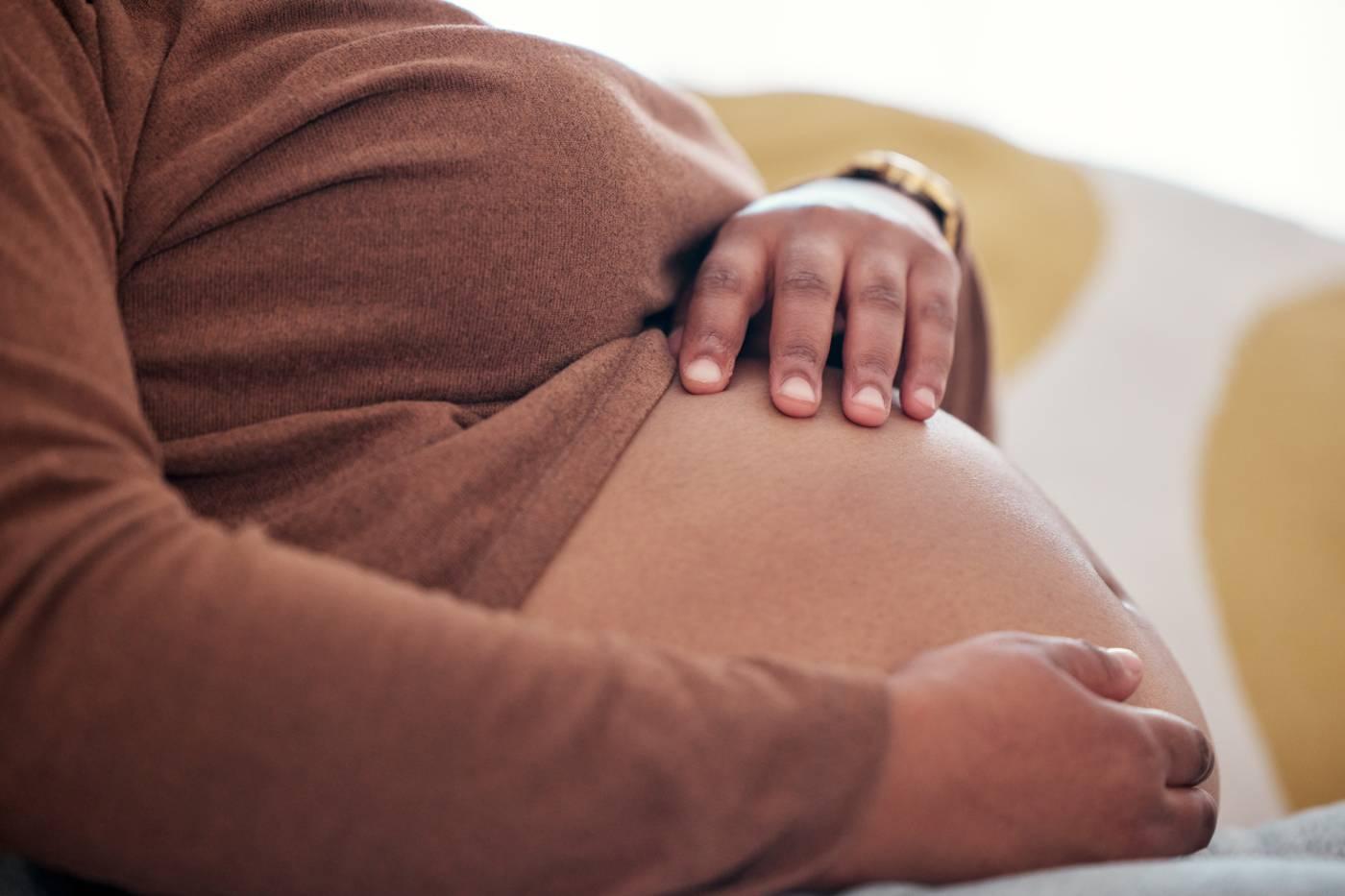PARENTS
Why Black Maternal Health Is Everyone’s Concern
Black mothers are nearly three times more likely to die before, during, and after birth than their white counterparts. Find out why—and what we can all start doing about it.

Written by
Happiest Baby Staff

Content warning: This post discusses maternal mortality.
Time often brings progress when it comes to medicine. But tragically, that’s not been the case when it comes to maternal mortality. In 2021, there was a 40% increase in maternal mortality from the previous year, which is more than 10 times the estimated rate of other high-income countries, like Australia and Japan. (Maternal mortality is when a person’s death is related to pregnancy, delivery, or occurs soon after delivery.) Even worse: The maternal death rate for Black parents in 2021 was nearly three times higher than that of white parents, according to the Centers for Disease Control and Prevention (CDC). This divide is in no way buffered by age or education. For example, Black mothers between 30 and 34 were over four times more likely to succumb to maternal mortality than white parents of the same age. And those with a college degree were five times more likely to suffer maternal mortality than white parents with the same education, according to a 2022 report from the Kaiser Family Foundation (KFF).
In honor of the eighth annual Black Maternal Health Week (BMHW), founded by the mothers of Black Mamas Matter Alliance, we explore some of the key causes behind this national crisis—as well as the changes that could truly make a difference.
The Black Maternal Health Care Crisis
There are many systemic, cultural, governmental, and personal reasons why Black maternal health care is on very shaky ground in America. While the following is in no way a full picture, it is a snapshot of a few ways the system has failed Black mamas.
The Prenatal Care Gap
It’s not surprising that starting prenatal care in the third trimester—or receiving no prenatal care at all—increases one’s risk of pregnancy complications, including preterm birth. That’s exactly what’s happening to many Black mothers, who are nearly twice as likely than their white counterparts to give birth with late or no prenatal care. The preterm birth rate among Black parents is 50% higher than the rate among all other birthing parents combined. While lack of insurance coverage for maternity care can prevent some Black mamas from receiving sufficient prenatal care, Black parents-to-be also avoid prenatal care because of the way they’re treated by providers.
Racism in Healthcare
Just as racism is present on school playgrounds, in shops, and at workplaces, research shows that racism is pervasive in doctor’s offices, as well. Clinicians themselves note that racism is a key factor disrupting “optimal prenatal care” and the collective Black birthing experience, according to a 2022 study in Women’s Health Reports. For example, pregnant or not, research shows that Black Americans are systematically undertreated for pain relative to white Americans. About 1 in 4 BIPOC parents-to-be say they were mistreated while in labor or during the birthing process, notes a 2019 report in the journal Reproductive Health. The study also found that, regardless of the expectant parent’s race, if their partner was Black, their risk for mistreatment went up, too. With that, it’s likely little surprise to learn that Black infants are more likely to survive if their doctors are also Black.
Disparities in Postpartum Care
The impact of Black parents-to-be having limited to zero prenatal care spreads beyond pregnancy and birth outcomes. Research shows that these folks are also less likely to go to their postpartum follow-up visit, which impacts their mental and physical health. Black mothers are more likely to experience long-lasting mental health concerns after childbirth than non-Black parents, including postpartum depression and posttraumatic stress disorder—and they’re less likely to seek or receive treatment, according to the American Psychological Association. At the same time, Black parents are 3.5 times more likely to experience late maternal deaths, which occurs between six weeks and one year postpartum, than their white counterparts. (Postpartum cardiomyopathy is the leading cause of late maternal death and Black mothers are six times more likely to experience this than white mothers.)
Holes in Healthcare Infrastructure
But lack of prenatal care and not feeling heard or seen by providers are not the only reasons behind these tragic numbers. Adding to the problem: Even though Medicaid covers almost half of births nationally, many pregnant people lose coverage at the end of a 60-day postpartum period. That’s because, in many states, eligibility levels are lower for parents than pregnant folks. This is particularly true for states that have not implemented the Affordable Care Act Medicaid expansion. The majority of folks in this treatment gap are Black.
How to Bridge the Gap in Black Maternal Care
While the state of maternal care for Black parents is no doubt devastating, research shows that more than 80% of pregnancy-related deaths are preventable—which means that with education and hard work, the state of Black maternal health can turn around. While not a comprehensive list, here are few ways to start getting there:
Cultivate culturally sensitive care.
One important way to improve the health of Black mothers and their babies is to strengthen the cultural understanding between practitioners and their Black patients, notes the University of Minnesota School of Public Health. In part, healthcare providers can practice “cultural humility” by asking about—and recognizing—cultural differences between themselves and their patients. For example, a study on expectant Black mamas in the Journal of Obstetric, Gynecologic & Neonatal Nursing noted the importance of having providers who can suggest cultural appropriate food choices to ensure moms-to-be are getting proper nutrition. To help ensure you’re getting the culturally appropriate care you need, you can seek out culturally sensitive doctor in your area and lean into the Anti-Racist Prenatal and Postnatal Care Preferences, created by former doula, Erica Chidi, a sexual and reproductive health education app, and Erica Cahill, M.D., assistant professor of obstetrics and gynecology at Stanford University.
Tune into implicit bias.
Black birthing parents shouldn’t be relegated to just Black doctors. After all, only 5.4% of U.S. physicians are Black, even though Black folks make up nearly 13% of the total population. Instead, “non-Black providers need to know where their biases lie and [that knowledge] needs to stay in the forefront of their minds,” notes doula Arielle Saturné, founder of The Auntie Doula in Los Angeles. “It’s important to know where we’re ill-equipped and then to outsource when we know there are more qualified people that can provide better services.” To help become equipped, providers should focus on chipping away at implicit biases, which exist outside of consciousness. That means a doctor or nurse can wholeheartedly believe that they’re not biased, but unconsciously harbor latent stereotypes that go against their conscious belief system. Healthcare pros—and the systems they work for—should, of course, spearhead formal implicit bias training. And you should feel empowered to ask any would-be maternity health provider if they’ve had any bias training, too.
Broaden access to doula care.
Research shows that Black doula care is a proven means of reducing racial disparities in maternal health and improving overall health outcomes. Specifically, access to doulas has been shown to increase the rate of full-term births, reduce the number of cesarean sections, and lower rates of postpartum depression in Black mothers when compared to state and national averages. Part of the reason: Doulas spend up to 11 times as much time supporting their pregnant clients as compared to doctors and hospital staff. Also, community-based doulas are often share the same background and culture as their clients they serve, so they’re generally better equipped to offer culturally appropriate support. To find a Black doula in your area, consult the National Black Doula’s Association or the Sista Midwife Directory.
Listen and amplify voices of Black mamas.
It’s very important to create safe spaces for expectant and new Black parents to have their voices and worries heard. And to get there, it’s equally important to include more and more Black physicians, midwives, nurses, doulas, and mothers in maternal health care research and initiatives. To wit, Saturné (founder of Trust Your Gut Birthing) rhetorically asks, “How can I fully support you if I don’t understand the kinds of stressors you face and what kind of impact that may have on you during pregnancy?”
Make a mental health care a priority, too.
Even though the American College of Obstetricians and Gynecologists (ACOG) recommends all new moms get screened for PPD and anxiety during their postpartum visit, research shows that less than half of Black mamas are actually screened for these mental health issues. So, it’s important to align with a provider who will screen during the postpartum period—and throughout your journey to parenthood. After all, research has shown that mental health care services are most effective when integrated into maternity services, especially for Black mamas. And the interventions that have been shown to help the most are sister circles, patient advocacy, cultural-sensitivity training—and self-advocacy. “It’s vital that we learn to advocate for ourselves and bring in others who can hold that advocacy with us,” says Eunique (euni) Deeann, a doula, postpartum researcher, and founder of Slowbirth Collective in San Diego, California. “All too often, our livelihood, and lives can depend on it.”
More on Black Maternal Health
- More Insights from A Black Doula
- Mental Health Resources for Black Parents
- How One Mom Is Taking on the Black Maternal Health Crisis
***
REFERENCES
- Maternal Mortality Rates in the United States, 2021. National Center for Health Statistics: Health E-Stats. March 2023
- Organisation for Economic Co-Operation And Development: Health Status : Maternal and infant mortality
- Kaiser Family Foundation (KFF): Racial Disparities in Maternal and Infant Health: Current Status and Efforts to Address Them
- March of Dimes: “Birthing While Black: Examining America’s Black Maternal Health Crisis”
- Boston University: Why Black Women Face More Health Risks Before, During, and After Pregnancy
- Harvard Public Health: America Is Failing Its Black Mothers
- Clinicians' Perspectives on Racism and Black Women's Maternal Health. Women’s Health Reports. May 2022
- Racial bias in pain assessment and treatment recommendations, and false beliefs about biological differences between blacks and whites. April 2016
- The Giving Voice to Mothers study: inequity and mistreatment during pregnancy and childbirth in the United States. Reproductive Health. June 2019
- Physician–patient racial concordance and disparities in birthing mortality for newborns. August 2020
- Predictive Factors for Loss to Postpartum Follow-Up Among Low Income HIV-Infected Women in Texas. AIDS Patient Care and STDs. May 2014
- American Psychological Association: Focusing on maternity and postpartum care for Black mothers leads to better outcomes
- National Institutes of Health (NIH): NIH-funded study highlights stark racial disparities in maternal deaths
- Racial/Ethnic Disparities in Pregnancy-Related Deaths — United States, 2007–2016. Morbidity and Mortality Weekly Report (MMWR). September 2019
- KFF: Status of State Medicaid Expansion Decisions: Interactive Map
- Centers for Disease Control and Prevention (CDC): Four in 5 pregnancy-related deaths in the U.S. are preventable
- University of Minnesota School of Public Health: Providing culturally sensitive pregnancy care to black women
- Nutrition of Black Women During Pregnancy. Journal of Obstetric, Gynecologic & Neonatal Nursing. April 2017
- Historical Trends in the Representativeness and Incomes of Black Physicians, 1900–2018. Journal of General Internal Medicine. April 2021
- Tackling Implicit Bias in Health Care. The New England Journal of Medicine. July 2022
- National Health Law Program: Doula Care Improves Health Outcomes, Reduces Racial Disparities and Cuts Cost
- BlueCross BlueShield, The Health of America: Data show community-based doulas improve outcomes for Black mothers
- Village Birth International, Ancient Song Doula Services, in collaboration with Every Mother Counts: Advancing Birth Justice: Community-Based Doula Models as a Standard of Care for Ending Racial Disparities
- The Century Foundation: Solving the Black Maternal Health Crisis Will Require Advancing Access to Community-Based Doula Care
- American College of Obstetricians and Gynecologists (ACOG): Screening for Perinatal Depression
- Perinatal depression screening practices in a large health system: identifying current state and assessing opportunities to provide more equitable care. Archives of Women's Mental Health. May 2020
- Improving Mothers’ Care - Surveillance of maternal deaths in the UK 2011-13 and lessons learned to inform maternity care from the UK and Ireland Confidential Enquiries into Maternal Deaths and Morbidity 2009-13. Oxford: National Perinatal Epidemiology Unit, University of Oxford. December 2015
- Sister Circles as a Culturally Relevant Intervention for Anxious African American Women. Clinical Psychology (New York). September 2011
Disclaimer: The information on our site is NOT medical advice for any specific person or condition. It is only meant as general information. If you have any medical questions and concerns about your child or yourself, please contact your health provider.
SHARE THIS ARTICLE
MOST LOVED
Sleepytime Sidekicks












